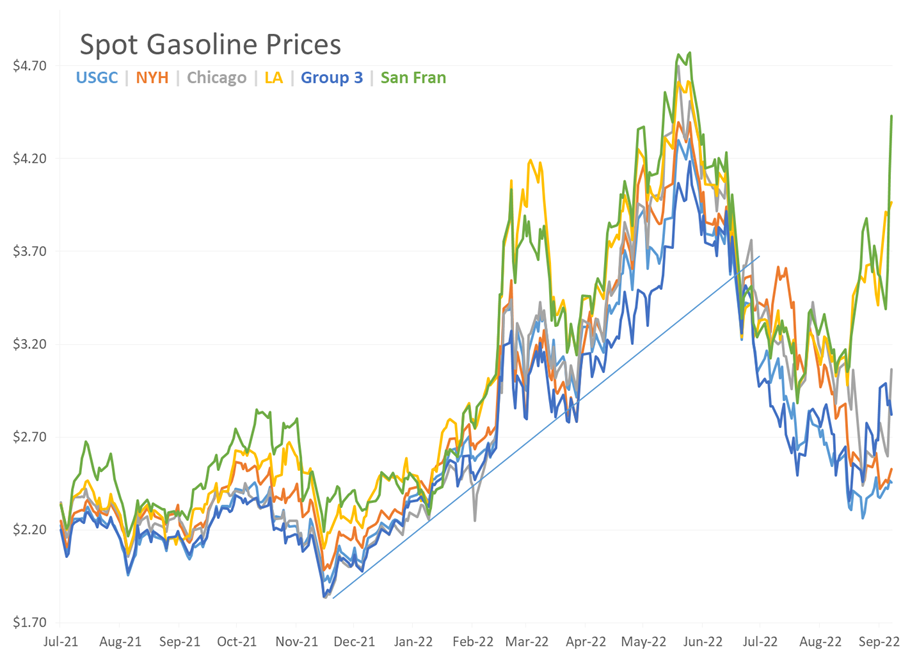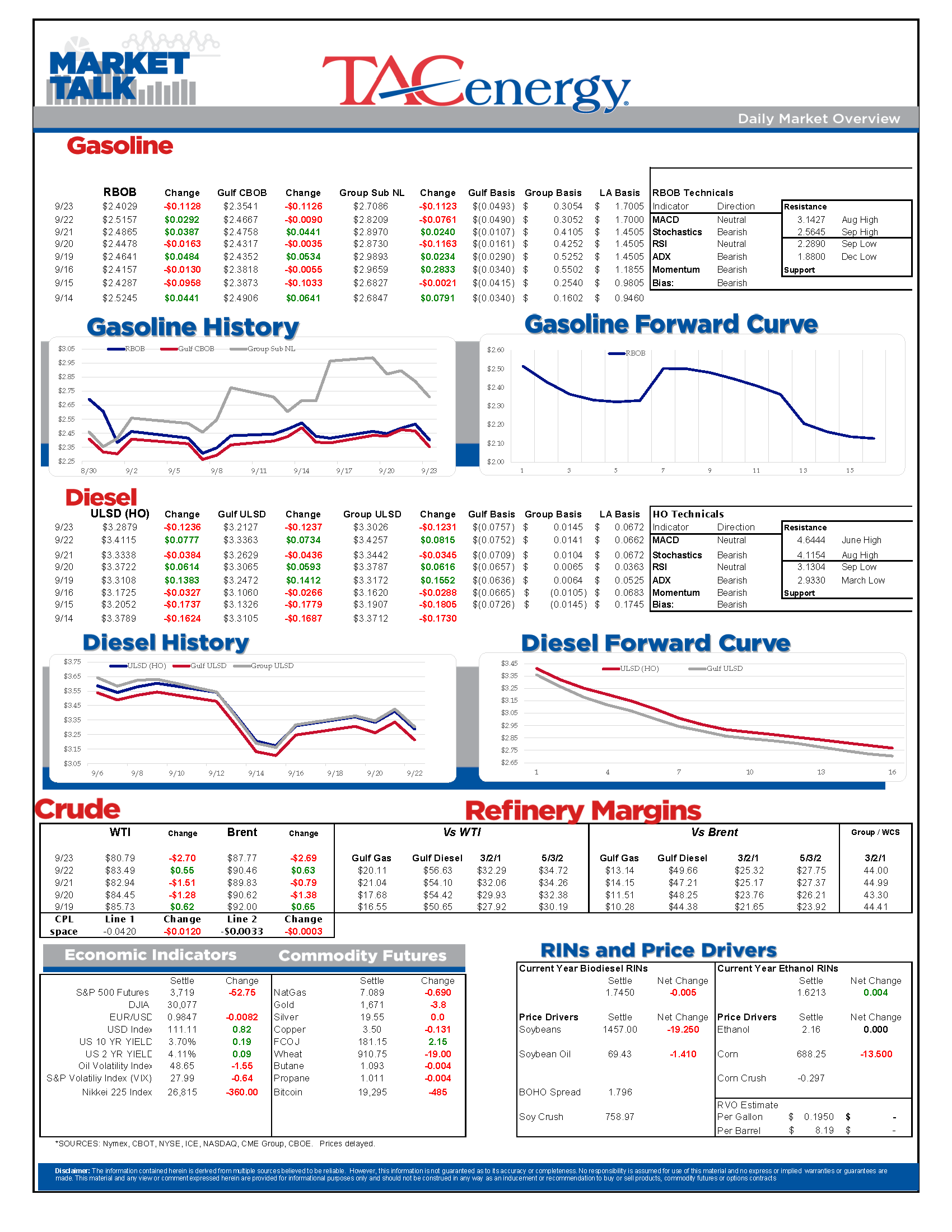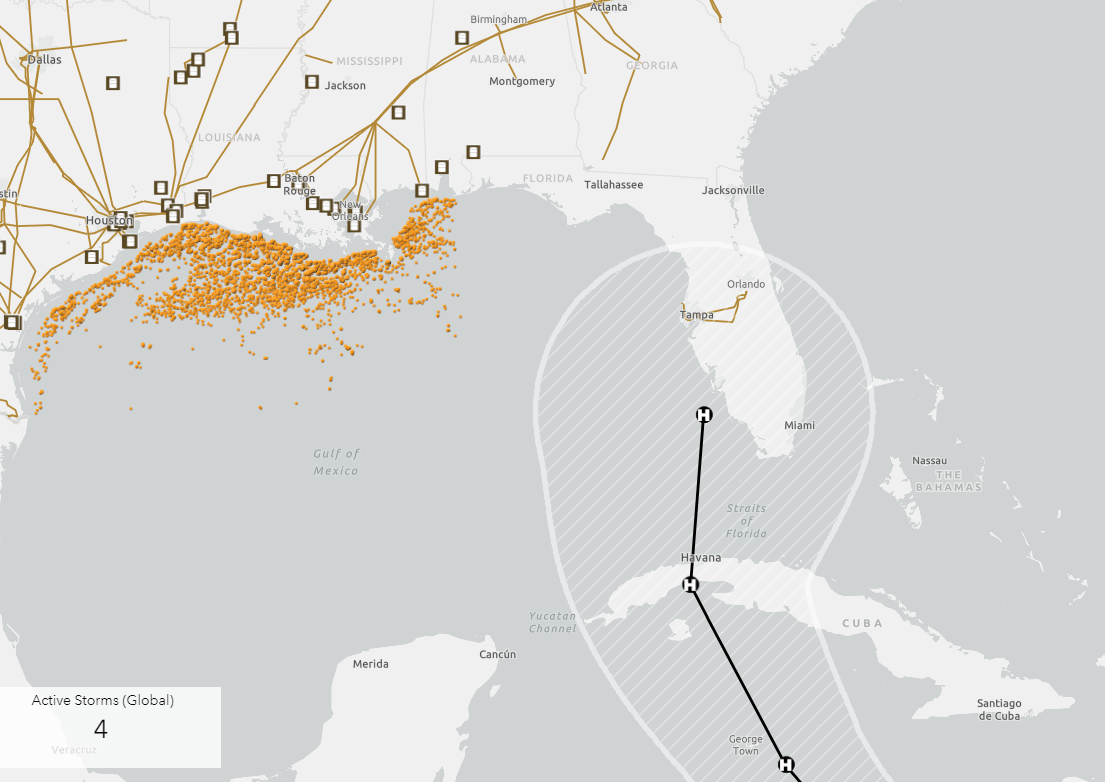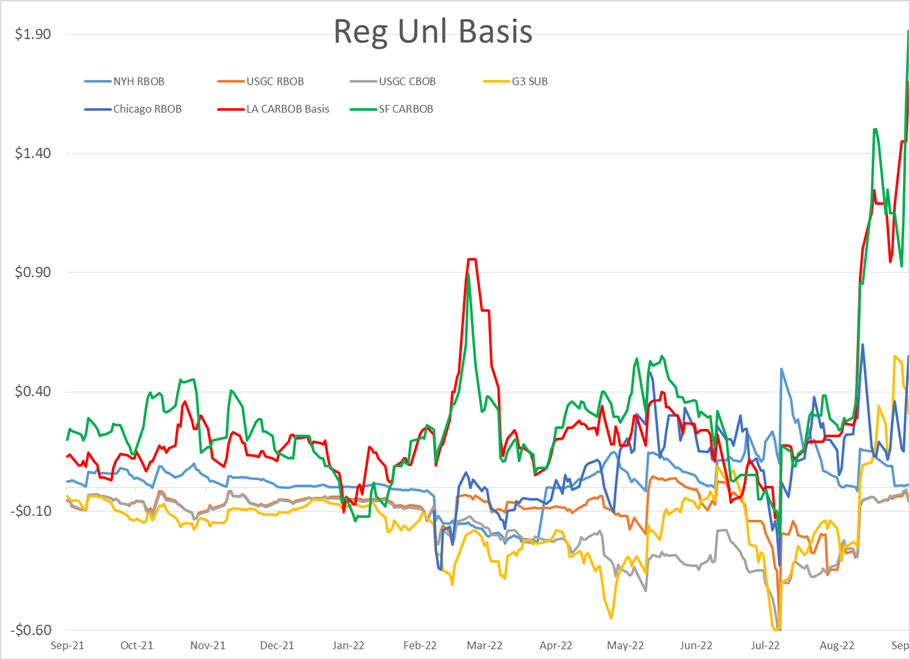Risk Taking Has Fallen Out Of Favor As Markets Around The World Fall Out Of Bed With Heavy Losses To Start Friday’s Trading

Risk taking has fallen out of favor as markets around the world fall out of bed with heavy losses to start Friday’s trading. Refined product futures are seeing heavy selling this morning, down 13 cents or more in the early going, despite signs from cash markets of supply tightness in numerous spots around the country.
Diesel prices would still finish with 10 cent gains for the week if they settled at current levels, but have dropped 20 cents from Wednesday’s high just a few ticks below the $3.50 mark. That pullback keeps a downward trend line in place that started from the August 25th high of $4.11, and would set up another test of the $3.14 range in the next week or two if prices don’t rally soon. Ordinarily, those types of swings would make for a busy year, and now we’re used to it happening in a month.
Fiona looks like it will set records as one of the strongest storms to ever hit the Canadian coast this weekend, but appears like it will stay just far enough east to avoid a hit on the Irving refinery in St. John New Brunswick. Shipping in the region will certainly be impacted as the storm blows through, but the current path appears favorable to avoid significant long term damage to ports.
The storm likely to be named Hermine was upgraded to a tropical depression overnight, and is now expected to hit south west Florida as a category 2 or 3 Hurricane Tuesday or Wednesday. The Key West and Ft. Myers are looking particularly vulnerable from the path of this system, with Cuba looking like the only thing that might slow the storm’s rapid intensification as it crosses the extremely warm waters in the Caribbean this weekend. The good news for energy supplies about this forecast path is that it keeps it well east of the oil production and refining zones in the Gulf of Mexico. That won’t prevent a surge of panic buying in Florida, but it will help resupplies once the storm has passed. Some models have this storm making additional landfalls on the east coast next week.
It’s been a rough week for refineries around the world. A fire at Husky’s refinery in Ohio killed 2 workers and has sent Chicago basis values soaring. Exxon is shutting down a refinery in France after a walkout of workers, and now Argentinian oil unions are striking after refinery explosion killed 3 workers. While none of those facilities individually will create major disruptions, they are all clear reminders of both the dangers of the industry, and the vulnerability of supply with refining capacity stretched to its limits.
Speaking of which, the West Coast continues to struggle with extremely tight supplies of gasoline that have sent basis values surging $1.50-$2 above futures and most other regional markets. A rash of refinery issues, and no options from neighboring markets for summer-grade gasoline are both contributing to the extreme price action. The big question for the next two weeks is whether or not imports are available to help alleviate this tightness, or if resupplies will have to wait until the market converts to winter-grade gasoline.
Click here to download a PDF of today's TACenergy Market Talk.
Latest Posts
The Sell-Off Continues In Energy Markets, RBOB Gasoline Futures Are Now Down Nearly 13 Cents In The Past Two Days
Week 15 - US DOE Inventory Recap
Prices To Lease Space On Colonial’s Main Gasoline Line Continue To Rally This Week
Equity Markets Have Been Pulling Back Sharply In Recent Days As Inflation And Trade Concerns Inject A Sense Of Reality Into Stocks
Social Media
News & Views
View All
The Sell-Off Continues In Energy Markets, RBOB Gasoline Futures Are Now Down Nearly 13 Cents In The Past Two Days
The sell-off continues in energy markets. RBOB gasoline futures are now down nearly 13 cents in the past two days, and have fallen 16 cents from a week ago, leading to questions about whether or not we’ve seen the seasonal peak in gasoline prices. ULSD futures are also coming under heavy selling pressure, dropping 15 cents so far this week and are trading at their lowest level since January 3rd.
The drop on the weekly chart certainly takes away the upside momentum for gasoline that still favored a run at the $3 mark just a few days ago, but the longer term up-trend that helped propel a 90-cent increase since mid-December is still intact as long as prices stay above the $2.60 mark for the next week. If diesel prices break below $2.50 there’s a strong possibility that we see another 30 cent price drop in the next couple of weeks.
An unwind of long positions after Iran’s attack on Israel was swatted out of the sky without further escalation (so far anyway) and reports that Russia is resuming refinery runs, both seeming to be contributing factors to the sharp pullback in prices.
Along with the uncertainty about where the next attacks may or may not occur, and if they will have any meaningful impact on supply, come no shortage of rumors about potential SPR releases or how OPEC might respond to the crisis. The only thing that’s certain at this point, is that there’s much more spare capacity for both oil production and refining now than there was 2 years ago, which seems to be helping keep a lid on prices despite so much tension.
In addition, for those that remember the chaos in oil markets 50 years ago sparked by similar events in and around Israel, read this note from the NY Times on why things are different this time around.
The DOE’s weekly status report was largely ignored in the midst of the big sell-off Wednesday, with few noteworthy items in the report.
Diesel demand did see a strong recovery from last week’s throwaway figure that proves the vulnerability of the weekly estimates, particularly the week after a holiday, but that did nothing to slow the sell-off in ULSD futures.
Perhaps the biggest next of the week was that the agency made its seasonal changes to nameplate refining capacity as facilities emerged from their spring maintenance.
PADD 2 saw an increase of 36mb/day, and PADD 3 increased by 72mb/day, both of which set new records for regional capacity. PADD 5 meanwhile continued its slow-motion decline, losing another 30mb/day of capacity as California’s war of attrition against the industry continues. It’s worth noting that given the glacial pace of EIA reporting on the topic, we’re unlikely to see the impact of Rodeo’s conversion in the official numbers until next year.
Speaking of which, if you believe the PADD 5 diesel chart below that suggests the region is running out of the fuel, when in fact there’s an excess in most local markets, you haven’t been paying attention. Gasoline inventories on the West Coast however do appear consistent with reality as less refining output and a lack of resupply options both continue to create headaches for suppliers.

Week 15 - US DOE Inventory Recap

Prices To Lease Space On Colonial’s Main Gasoline Line Continue To Rally This Week
Energy markets are sliding lower again to start Wednesday’s trading as demand concerns and weaker stock markets around the world seem to be outweighing any supply concerns for the time being.
Rumors continue to swirl about an “imminent” response by Israel to Iran’s attacks, but so far, no news seems to be taken as good news in the hopes that further escalation can be avoided, even as tensions near the Red Sea and Strait of Hormuz continue to simmer.
Prices to lease space on Colonial’s main gasoline line continue to rally this week, trading north of 11 cents/gallon as Gulf Coast producers still struggle to find outlets for their production, despite a healthy export market. Gulf Coast CBOB is trading at discounts of around 34 cents to futures, while Gulf Coast RBOB is trading around a 16-cent discount, which gives shippers room to pay up for the linespace and still deliver into the East Coast markets at a profit.
Back to reality, or just the start of more volatility? California CARBOB basis values have dropped back to “only” 40 cent premiums to RBOB futures this week, as multiple flaring events at California refineries don’t appear to have impacted supply. The state has been an island for fuel supplies for many years as its boutique grades prevent imports from neighboring states, and now add the conversion of the P66 Rodeo refinery to renewable diesel production and the pending changes to try and cap refinery profits, and it’s easier to understand why these markets are increasingly vulnerable to supply shocks and price spikes on gasoline.
RIN prices continue to fall this week, touching 44 cents/RIN for D4 and D6 values Tuesday, their lowest level in 6 weeks and just about a nickel above a 4-year low. While the sharp drop in RIN and LCFS values has caused several biodiesel and Renewable Diesel producers to either shut down or limit production, the growth in RIN generation continues thanks to projects like the Rodeo refinery conversion, making the supply in RINs still outpace the demand set by the Renewable Fuel Standard by a wide margin.
The API reported draws in refined products, 2.5 million barrels for gasoline and 427,000 barrels for distillates, while crude oil stocks had an estimated build of more than 4 million barrels. The DOE’s weekly report is due out at its normal time this morning.
Click here to download a PDF of today's TACenergy Market Talk.




